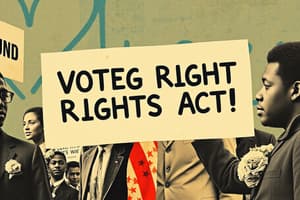Podcast
Questions and Answers
What program did the speaker participate in to study the Canadian political system in depth?
What program did the speaker participate in to study the Canadian political system in depth?
- Canadian Political Education Initiative
- Institute for Global Solutions (correct)
- Institute for Political Solutions
- Youth Political Engagement Program
What is the goal of the organization 'Vote 16' mentioned by the speaker?
What is the goal of the organization 'Vote 16' mentioned by the speaker?
- To increase voter turnout among young adults
- To reduce the voting age to 14
- To educate politicians about youth issues
- To extend voting rights to 16 and 17-year-olds (correct)
What does the speaker believe is necessary to engage young people in politics?
What does the speaker believe is necessary to engage young people in politics?
- Politicians fostering curiosity and understanding about politics (correct)
- Political education in schools
- Mandatory voting laws
- Social media campaigns targeting young people
What is the speaker's motivation for advocating for change?
What is the speaker's motivation for advocating for change?
What is unique about the generation the speaker represents?
What is unique about the generation the speaker represents?
What is the name of the local climate strike group the speaker has worked with?
What is the name of the local climate strike group the speaker has worked with?
At what age can you be tried in a Canadian court as an adult?
At what age can you be tried in a Canadian court as an adult?
Why does the speaker think 16-year-olds should have the right to vote?
Why does the speaker think 16-year-olds should have the right to vote?
What is the key to changing the perception that 16-year-olds are not ready to vote, according to the speaker?
What is the key to changing the perception that 16-year-olds are not ready to vote, according to the speaker?
What can civics classes in school provide, according to the speaker?
What can civics classes in school provide, according to the speaker?
Flashcards are hidden until you start studying
Study Notes
- The speaker is a Gen Z activist who believes their generation has the potential to change the world.
- Gen Z is the most well-educated generation yet, with more ethnic and racial diversity than any previous generation.
- Gen Z is the first social generation, having no memory of a world before the internet or smartphones.
- The speaker has worked with a local climate strike group called "Our Earth, Our Future," which is completely youth-run.
- The group mobilized over 20,000 people to the streets of Victoria, British Columbia, and empowered each other's ideas and developed new ones.
- The speaker believes that 16-year-olds should have the right to vote, citing that voting habits established early will usually stay with us for life.
- In Canada, the voting age was lowered from 21 to 18 in 1970, and women were given the right to vote in 1918.
- 16-year-olds can drive, drop out of school, and be tried in a Canadian court as an adult, but they have no say in where their tax money goes.
- The speaker believes that education is the key to changing the perception that 16-year-olds are not ready to vote.
- By letting 16 and 17-year-olds vote, they can maximize the effects of lifelong voting habits.
- The speaker suggests that civics classes in school can create a familiarity with voting and provide information about it.
- Aligning voting habits and education can serve future election success.
- On average, only 6 out of 10 young Canadians (aged 18-24) voted in the last three federal elections, the lowest percentage of any other age demographic.
- The speaker's education has played a significant role in their engagement and political awareness.
- The speaker has participated in a program called "Institute for Global Solutions" (IGS) that studies the Canadian political system in depth.
- The speaker cites an organization called "Vote 16" that aims to extend voting rights to 16 and 17-year-olds.
- The speaker believes that politicians can play a role in engaging with young people and fostering curiosity and understanding about politics.
- The speaker is part of a larger movement of young people advocating for change and believes that their generation is ready to participate in democracy.
Studying That Suits You
Use AI to generate personalized quizzes and flashcards to suit your learning preferences.




